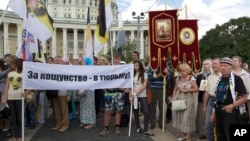The special U.N. investigator on freedom of religion or belief is calling for the universal repeal of blasphemy laws, saying they restrict freedom of expression and promote hatred of and intolerance toward minority religions.
In a report submitted Thursday to the U.N. Human Rights Council in Geneva, Heiner Bielefeldt said freedom of religion and freedom of expression are mutually reinforcing, allowing both rights to flourish, but that blasphemy laws cast a pall over these basic rights. He said religious minorities suffer most from the chilling effects the laws create.
Bielefeldt said Pakistan is known for its draconian blasphemy laws that even carry the death penalty. Although the ultimate sentence has never been carried out, he said many people accused of blasphemy are on death row.
The investigator said studies show that religious minorities in Pakistan who suffer disproportionally from the laws include Shi’ites, Christians and Ahmadis, who are accused of not being true Muslims; but, he noted numerous countries - in the Middle East, Southeast Asia, Central Asia and even Europe - have blasphemy laws on the books.
Bielefeldt said Germany, Denmark, Poland and Greece either have laws that hark back to the old colonial period or, what he calls, post-blasphemy laws. These, he said, are not meant to honor God, but to protect religious feelings. He told VOA that Russia also has tightened its blasphemy laws.
“Russia, also in the U.N. Human Rights Council now, really has taken over the torch from Pakistan to argue for the protection of the feelings of ordinary believers, which means mainly, of course, Orthodox believers. So, usually these blasphemy laws protect majorities... the feelings of majorities, while minorities pay the price,” Bielefeldt said.
In the interest of clarity and credibility, Bielefeldt said European countries should clean up the old-fashioned blasphemy laws or post-blasphemy laws as the Parliamentarian Assembly of the Council of Europe has demanded.
While the laws are largely associated with Muslim countries, he said they also exist within Hindu, Buddhist and Christian societies. He said they often are used to stifle critical voices and breed intolerance, discrimination and hatred against people based on religious belief.
In Central Asian countries and Russia, Bielefeldt said religious minorities increasingly are being targeted and arrested in the name of fighting extremism. While fighting extremism is a legitimate concern, he said this must not be done at the expense of restricting people’s basic human rights.





